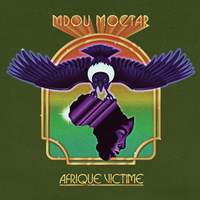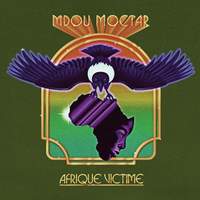Recording of the Week,
Mdou Moctar - Afrique Victime

Mahamadou Souleymane, known by his stage name Mdou Moctar, is a singer, songwriter and guitarist from the landlocked country of Niger in West Africa. One of the first musicians to combine the traditional music of the nomadic Tuareg people with electric guitar music, Moctar plays a style of rock dubbed ‘Tishoumaren’ by the people of the north-western African countries where it originated, while international audiences use ‘desert blues’ amongst a variety of other names. Tishoumaren sprung from the Tuareg people’s wider experiences with displacement and exile, as well as numerous rebellions, on the now postcolonial continent, with the word itself coming from the French word ‘chômeur’ - meaning ‘the unemployed’ - the loud, impassioned music an expression of this not so dissimilar to American blues. The guitar became emblematic of the Tuareg rebellions, and was banned during a period of social upheaval in Niger, forcing artists like Moctar’s contemporary Bombino into exile - the stakes couldn’t be higher for artists like Mdou Moctar. It’s this rebellious and sincere attitude that carries over into this week’s recommended recording, his sixth full-length studio album Afrique Victime.
Hailing from a Nigerien mining town, Moctar learned to play the guitar on one he built himself using bicycle cables for strings, as there were no music shops in his small village. Inspired by other Nigerien guitarists like Abdallah Oumbadougou, Moctar decided early on that rock music was his calling, much to the disapproval of his parents. It was videos of famed guitarist Eddie Van Halen that initially captivated Moctar, and nowadays he wields a white, left-handed Fender Stratocaster not dissimilar to Jimi Hendrix - though Moctar mentions he hadn’t listened to Hendrix until around 2015. It was this mixture of the music of his native Niger and more internationally-known players that fueled Moctar’s learning of the instrument. Following his first live performance in 2007, Moctar began recording music and released his debut record ‘Anar’ in 2008, finding a viral audience with music fans in the Saharan countries when his music was shared via cell phones and memory cards. This landed him on the compilation ‘Music From Saharan Cell Phones’, released by the Oregon-based label Sahel Sounds, which also helped in bringing this niche scene to a wider international audience.

The songs on Afrique Victime range from driving, upbeat tunes - the opening ‘Chismiten’ is a brilliant way to kick off the record - to more laid-back acoustic jams. Moctar’s guitar style is particularly characterised by his heavy use of trills and fluid fingerstyle technique, which combined with his propensity for writing some real earworm melodies takes many of the tracks beyond feeling like 70s rock tributes. Heavily ingrained in all the songs is the sound of traditional Tuareg music; right down to the vocal delivery and rhythmic feel. A track like ‘Tala Tannam’ is almost raga-like in the way it jams over a solid drone and rhythm, though what makes it distinctly Moctar is its unshakable melody and immediately recognisable guitar technique. The lyrics of Afrique Victime are very close to Moctar’s heart, both on a more personal level and in relation to the wider issues facing Niger. The track ‘Layla’, for instance, was written in tribute to his wife, who gave birth to their son while Moctar was on tour, while ‘Asdikte Akal’ has him reminiscing about his home village, missing his mother and brothers. Moctar also takes the opportunity on the title track to highlight the struggles of Niger’s people, whom despite having gained independence from France continue to struggle day-by-day; much of the country lacks electricity or clean water, despite being promised aid from France. Moctar closes out the track by channelling this frustration into all-out shredding, one of the more overtly psych-rock moments on the record.
Moctar’s equal appreciation of both the traditional sounds of his country and of Western guitar gods past is extremely palpable; there’s not an ounce of cynicism in his music. Whether he’s singing about the injustices faced by his people, reminiscing about his family back home, or in the middle of a fiery guitar solo, this is some of the most spirited music you’ll hear all year.




